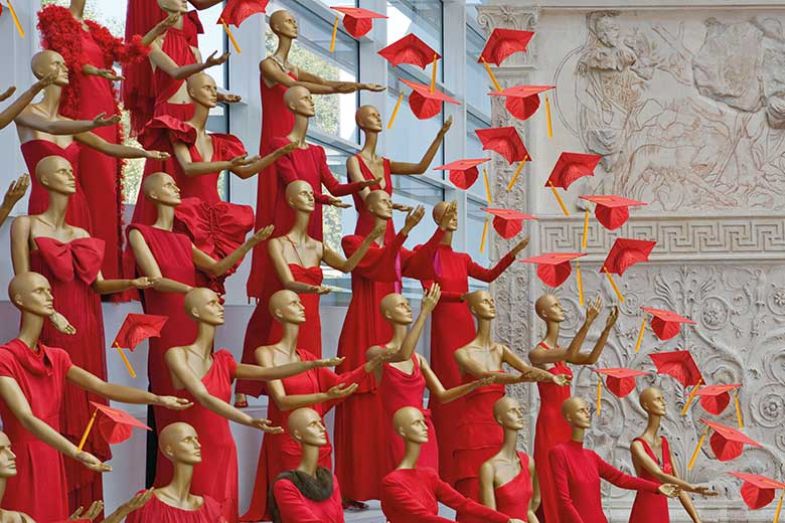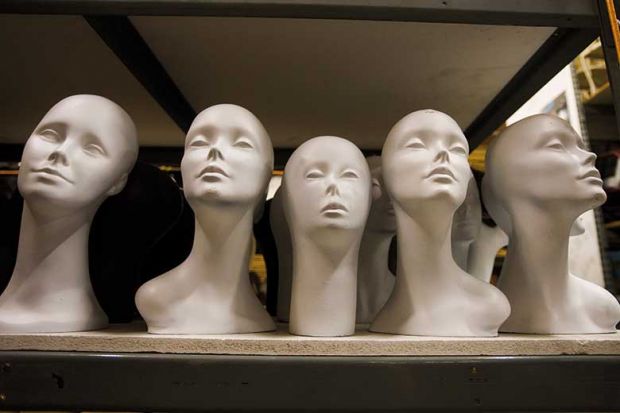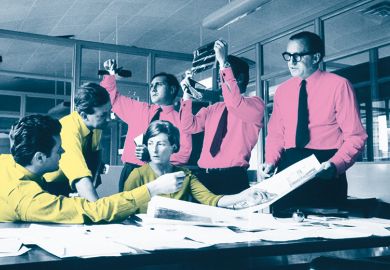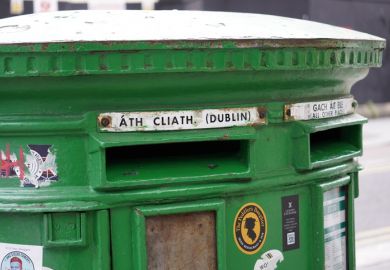A few years ago I was involved in a silly controversy about Shakespeare. I was asked to review a book that claimed that the plays attributed to him could not have been written by him and were actually written by the diplomat Sir Henry Neville.
An explicit premise of the argument was that the author of the plays must have attended a university. This assumption rendered the book worthless as far as I was concerned, and I would award it the Jean-Jacques Rousseau (“Man is born free...”) award for absurd assumptions taken to the level of an art form. In fact, hardly any of Shakespeare’s contemporaries in a golden age of theatre graduated from a university, Christopher Marlowe (Cambridge) being a notable exception. John Fletcher was registered at Cambridge at the age of 11, but there’s no evidence that he ever attended. I think Shakespeare would have been more likely to have acquired his facility with words and ideas, let alone his sense of theatre, in a pub than in the rigid, theocratic, scholastic milieu of the 16th-century university.
The observation about universities and theatre does not just hold true for the Shakespearean period. However you construct a list of great UK-based playwrights – and there are many versions online – it is unlikely to contain many graduates. The famously self-educated George Bernard Shaw did not go to university, of course, but nor did Noel Coward, Harold Pinter, Alan Ayckbourn or Tom Stoppard in our own time. In fact, apart from Marlowe, Oscar Wilde (Oxford) is the only graduate who regularly appears in the lists.
So, far from dismissing the claims of the glovemaker’s son from Stratford-upon-Avon, we should be discussing the anomaly that what might be seen as the most intellectual of art forms has been dominated by non-graduates. Interesting trivia or significant fact? Perhaps we should put it in the context of the claim by some modern historians that a crucial factor in the flowering of the Florentine Renaissance was the absence of a university in the city. There had been one, founded in 1321, but Lorenzo Di Medici got rid of it (it decamped to Pisa) and the artists and writers flocked to Florence. The current (main) University of Florence was founded in 1859.
On a similar theme, I must note that when I was recently in Newcastle upon Tyne with an hour to kill, I wandered into the premises of the Literary and Philosophical Society (there is no restriction on access). It was full of people: they were reading (choosing books from the largest private library outside London), informally teaching children, arguing about politics and playing chess, among other things. It reminded me of the universities of my youth, but it also reminded me that societies like this in the 18th and 19th centuries made far larger contributions to intellectual development than universities did. It was at the “Lit & Phil”, founded in 1793, that Sir Joseph Swan demonstrated the first electric light bulb (people still believe it was Edison even though Swan successfully sued him) and Harriet Martineau made her contributions to the idea of a social science – at a time when she wouldn’t have got near a university. The society still feels like a hive of genuinely intellectual activity, unlike most contemporary universities, prompting the thought that the more universities feel like clubs, the better they are.
These reflections do not come easily to me. I am a child of the 1960s, a decade that took me from the under-14 rugby team to a full-time academic post. I was a career academic, and universities, for me, were the embodiment of Millian liberalism, where vigorous and uninhibited discussion led to intellectual clarity: where a critical mass of mainly young, clever people generated open-mindedness, a willingness to listen and learn and a prima facie assumption of equality. This is what the Oxford and Warwick of my first 10 years were like. I vigorously debated all the way from the seminar room to the changing room and back to the bar. In retrospect, far too much of this consisted of attacking Marxism, but, as we sportsmen say, you can only play what’s put in front of you. (I can’t remember whether, in my short time teaching political theory, I ever managed to get my related exam question on to an actual paper: “Third rate philosopher, second rate economist, first rate bore.” Discuss this view of Karl Marx.)
I was generally innocent of knowledge of universities in other times and places and did not realise that I was living through a rather fortunate anomaly. I assumed that free debate was the very essence of university life. But I should have known better from the start because in my first year as an undergraduate I could not get from my room to the outside world without passing the Shelley Memorial, a grotesque prone white marble statue of the poet’s drowned and naked body washed up on the Ligurian shore. He may have been of sufficient status by 1893, when the monument was unveiled, to warrant such reverence, but in 1811 University College had expelled him for his atheistic opinions.
I now realise that universities, by their nature, contain much more sinister and repressive tendencies. They develop hierarchies that, given the nature of power, tend to become more extreme: a university in which “leaders” or “managers” are paid salaries 10 times those of their followers must be one that is repressive and encourages conformity. They require narrow specialisation. They tend to embody and develop prevailing ideologies. They look for paymasters whose interests they must then support. These tendencies constitute the dark side of the idea of a university; they were growing in force during my time and have accelerated in the 15 years since I retired.
Everybody knows that only a minority of people working in contemporary anglophone universities have anything that might qualify as “tenure”, an institution invented in the US to protect academic freedom from the vagaries and idiocies of fashion and local opinion. Many, if not most, academics are subject to what I will call “Toynbee syndrome”; that is, they have paymasters with vested interests – the reference being to Arnold Toynbee (grandfather of my undergraduate contemporary, the journalist Polly Toynbee), who was forced to resign his position at King’s College London in 1924 because his increasingly pro-Turkish sympathies displeased the Greek shipping magnates who were among the institution’s largest benefactors. I don’t know what I’d have done faced with three-year contracts and a daily task whose success was defined by pleasing somebody else, but I think I’d have sought a different career. And, sure enough, over the years, fewer and fewer of the cleverest students I met chose academic life.

The worst feature of contemporary university life, however, is the unstated, but real, requirement of ideological conformity. It amounts to a kind of crude humanist theology, the equivalent of the old scholasticism and religious orthodoxy. A necessary condition of a serious intellectual life should be a willingness to entertain all propositions. If you are allowed to say that “all history is the history of class struggles” and that the wafer biscuit really does turn into the body of Jesus Christ – and, of course, those propositions should be considered – then you should also be permitted to consider the idea that the Holocaust didn’t really happen and that a woman’s place is in the kitchen. All opinions without exception should be allowed a platform and I remember with some nostalgia the South African ambassador (South Africa being a non-member of the Commonwealth at the time) coming to speak to Warwick’s Politics Society about the necessity of apartheid. The audience was predominantly black and they addressed the ambassador vehemently, but they argued with him. Have we lost that spirit?
The idea that this is about “political correctness” trivialises the problem. It is really about a kind of pseudo-objectivity, the denial of fundamental intellectual diversity. Its most obvious symptom is research assessment, the (preposterous) notion that the value of intellectual activity can be measured in the short term by a committee of the creator’s rivals and/or allies – but, as I have been banging on about that for half a lifetime, I will not dwell on it.
I find the smaller symptoms of this pseudo-objectivity more disturbing than the dramatised issue of no platforming. In my last examiners’ meeting, while on a “buy-back”, I was reprimanded by the chairman of the board for trying to initiate a discussion of a borderline candidate’s merits: the sort of discussion we had had for decades, on the basis that there is ultimately no right answer to an exam question in politics, and that when the exam score is equivocal in terms of degree classification, it is reasonable to consider both any problems (such as illness) the candidate might have had, and any other evidence of academic ability, such as performance during tutorial discussions.
We don’t do that any more, I was told: we calculate degree classifications according to determinate arithmetical formulae. (Privately, everybody always said this was because of the fear of litigation, but I don’t remember any litigation.) So a whole room full of intelligent people sit there, pretending that the number 68, probably written down by the examiner at midnight in the midst of marking 50 scripts, has some kind of unchallengeable value.
Where is Lorenzo Di Medici when you need him? Half a millennium on, we need someone to put a bomb under a university system that is increasingly bloated, bureaucratic and blinkered. I find it interesting to note that the current state of universities vividly exemplifies an argument that the late Oxford philosopher Brian Barry used to make about the concept of equality. He said that its most common function was to justify inequalities. People in universities have never believed more unquestioningly in the theoretical equality of human beings, but while considerable progress has been made regarding gender and racial equality within the academy, the fact that there has never been greater inequality of tenure, status and financial reward suggests that we no longer believe in other aspects and implications of that fundamental belief.
The new Lorenzo should reduce the size of the UK university sector, decimate its “management” class, and hive off all vocational education to pay for itself. Above all, he or she should acknowledge the potential of self-education, which has always been underestimated and which is now limitless because of the internet. As a lifelong quizzer, I have met postmen and plumbers who have more general knowledge and a better grasp on the world than most professors. And as a habitual traveller, I have met people all over the world whose linguistic skills, acquired from their computers, would put those of many language graduates to shame.
Qualifications should be awarded regardless of university attendance, by “competitive public examination”, to use that grand Victorian phrase, with the marking done by complete outsiders (I always thought that institutions – let alone individuals – grading the people they teach could only lead to grade inflation and corruption, and I was right). All this should do something to revive the almost defunct process of social mobility.
Of course, you’re assuming that none of this will ever happen. But you assumed that Brexit and Trump would never happen, didn’t you?
Lincoln Allison is emeritus reader in politics at the University of Warwick.
POSTSCRIPT:
Print headline: All things being unequal
Register to continue
Why register?
- Registration is free and only takes a moment
- Once registered, you can read 3 articles a month
- Sign up for our newsletter
Subscribe
Or subscribe for unlimited access to:
- Unlimited access to news, views, insights & reviews
- Digital editions
- Digital access to THE’s university and college rankings analysis
Already registered or a current subscriber?








